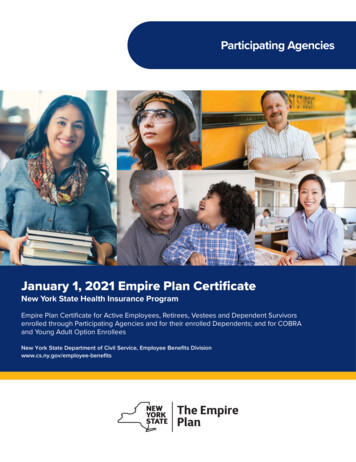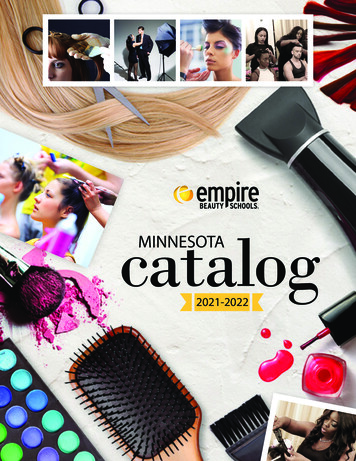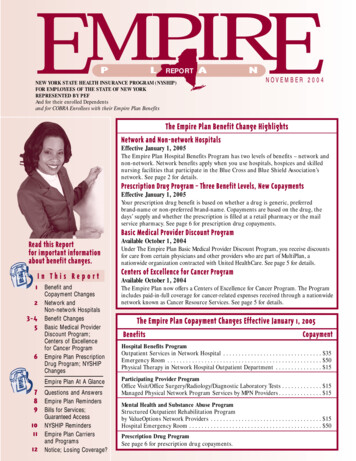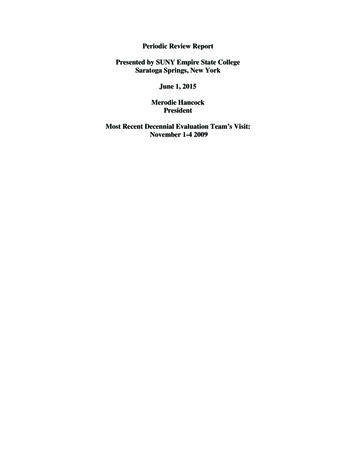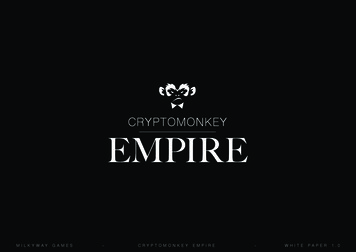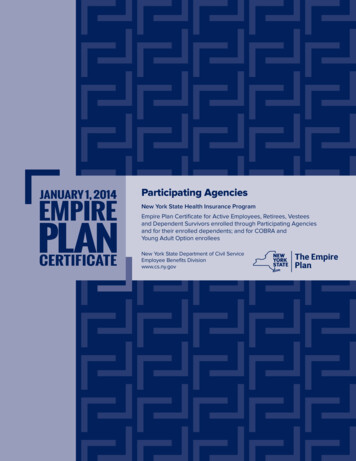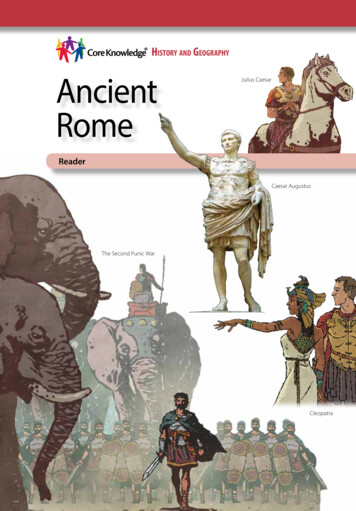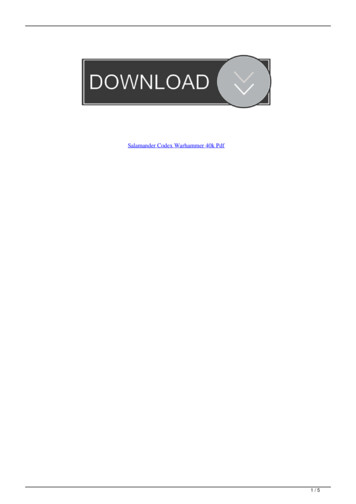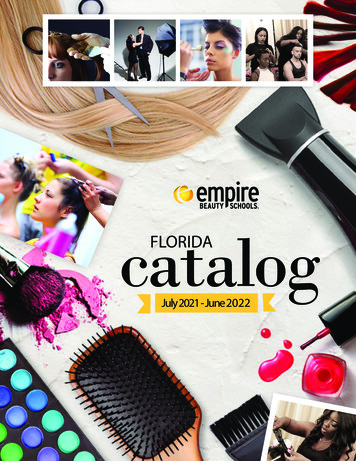
Transcription
2017-18ANNUAL REPORTto Governor Andrew Cuomo andthe New York State LegislatureEmpire State DevelopmentHoward Zemsky, President & CEO, Empire State DevelopmentCommissioner, NYS Department of Economic Development1
INTRODUCTIONEXECUTIVE SUMMARYThe Entrepreneurial Assistance Program (“EAP”) is an enterprise development program withcenters in local communities throughout New York State. These Entrepreneurial AssistanceProgram Centers (“EAP Centers” or “Centers”) provide instruction, training, technical assistanceand support services to individuals who have recently started their own business or are interestedin starting a business and also strengthen the operation of these firms during the early stages ofdevelopment, generally within the first five years.For the 2017 EAP contract year, from June 1, 2017 to May 31, 2018, each organization fundedunder EAP received 81,465 in state funding to continue providing business training and skilldevelopment to New York State entrepreneurs. These grant funds were matched with cash and inkind funding from other non-state sources.EAP assists new and aspiring entrepreneurs in developing basic business management skillsby providing business training, one-on-one counseling and technical assistance. For Centersto maintain continued EAP status, they must meet specific performance objectives set at thebeginning of their contract year. The goals of the program are to increase the formation of newbusinesses and strengthen the operations of existing businesses during the early stages ofdevelopment with increased sales, job creation and business financing. (reference Table 1, Page 16)2Fiscal 2017-2018 marked the 30th anniversary of the EAP. Over the course of its years EAPhas helped aspiring New York State small business owners turn their dreams into reality andestablished centers in local communities to provide instruction, training, technical assistance andsupport services.
PROGRAM OVERVIEWThe Omnibus Economic Development Law of 1987 authorizes Empire State Development (“ESD”),through the Entrepreneurial Assistance Program, to issue contracts to not-for-profit corporations,universities and community colleges for the development of EAP Centers to provide comprehensiveassistance in enterprise development to owners and prospective owners of small businesses.Encouraging the formation and growth of small businesses is an important strategic goal of NewYork State. EAP programs provide intensive, community-based training, technical assistanceand other related services to small business owners or entrepreneurs, particularly minorities andwomen, to stimulate new business development and to strengthen businesses in the early stages ofdevelopment—typically from one to five years. Such assistance is especially important in economicallydistressed areas where high levels of unemployment and declining infrastructure further limit the abilityfor these young businesses to develop. Effective programs are built on a working knowledge of theneeds and resources of a community and its region.There are 24 EAP Centers (see Entrepreneurial Assistance Program Center Listing, Page 19) servingNew York State. The Centers work with ESD regional offices and many local and state agencies. Inaddition, they collaborate with local businesses, chambers of commerce, non-profit agencies, collegesand universities.The EAP Centers provide a 60-hour entrepreneurship training course, supplemented by intensivetechnical assistance, to help new entrepreneurs complete business plans and develop a viablebusiness. Participants learn how to refine their business concept, conduct break-even analysis,develop marketing strategies and learn financial management skills.In FY 17-18 EAP Centers provided over 8,300 hours of one-on-onecounseling and helped clients create more than 297 business plans.EAP Centers also give technical assistance to existing businesses that are generally less than fiveyears old. This technical assistance is designed to help these microbusinesses over time to ensureconditions that will support their sustainability and allow for expansion. Such support includes accessto working capital and cash-flow management, general management skills, new market development,hiring and managing employees, managing growth and sourcing available credit.OBJECTIVESThe primary objectives of EAP are to: Increase the number of new businesses in New York State, with a particular focus onexpanding economic opportunity for minority group members, women, dislocated workersand individuals with special needs; Expand the sales and employment levels of small businesses during the critical first fiveyears of operation; Decrease the business failure rates among small businesses in the state; and Assist in the revitalization of distressed communities through the encouragement of “homegrown” businesses.3
ADDITIONAL SERVICESThe Entrepreneurial Assistance Program Centers support the following initiatives to increasethe formation of new businesses owned and operated by minorities, women, dislocatedworkers and individuals with special needs:Business Mentor New York (BMNY)Business Mentor New York is an online platform that connects volunteer mentors to smallbusinesses and emerging entrepreneurs to help them address specific challenges and realizetheir full economic potential. EAP Centers facilitate BMNY registrations for clients, assist withtheir mentee profile and help connect the entrepreneurs with mentors. The EAP Centersrecognize that all successful entrepreneurs need confidence and connections. To facilitatethis, they encourage local community professionals and EAP workshop presenters to registeras mentors. Following are BMNY results from the EAP Centers: 296 new mentees enrolled into BMNY; 75 new mentors were added; and 288 counseling matches occurred.The Department of State – Office of New AmericansThe Office of New Americans (ONA) helps New Americans fully participate in New YorkState civic and economic life. ONA operates through a network of 27 community-basedorganizations.ONA entered into a three-year contract, from January 1, 2016 to December 31, 2018, to teachtwo “Starting Your Own Business” seminars biannually at each ONA Center. The 27 ONACenters were matched with 17 EAP Centers to conduct these seminars on mutually agreedupon dates throughout the year.EAP Centers provided workshops on business ownership in Americato 602 New Americans in 2017. Comprehensive instructions featuredhow to start and register a business in New York State includinginformation on tax and licensing requirements. A cumulative total of1,300 New Americans have been initiated to this process.Each EAP Center customized the training to the population being served. In some cases, theclasses were conducted in dual-language instruction (e.g. Spanish, Chinese, Haitian Creole, etc.)4
Minority and Women Business Enterprise Support and OutcomesEAP Centers also work closely with NYS’s Division of Minority and Women’s BusinessDevelopment. Centers provide direct assistance to individuals interested in becoming MWBEcertified to do business with New York State. EAP Center staff is trained to provide guidance inthe preparation of MWBE online certification applications. MWBEs receiving services from theCenters had the following outcomes: (reference Table 2, Page 17) 465 MWBE businesses increased sales by 60.3 million; 209 MWBE businesses increased employment by 517 new hires; 237 MWBE businesses retained 1,854 employees; and 139 MWBE businesses secured 5.3 million in financing.Veteran Entrepreneurship ServicesVeteran entrepreneurship services, introduced in FY14-15, are now a permanent part ofeach EAP Center’s goals. EAP Centers continue to meet veteran goals and providedentrepreneurship services to veterans interested in starting a business or expanding anexisting business which includes but is not limited to: (1) counseling on the feasibility of startinga business; (2) education in established management principles and practices; (3) access toveteran business support networks; and (4) ongoing and continued technical assistance.Some EAP Centers offer customized programs for veterans at free or reduced prices forservices and have also formed partnerships with many different veteran organizations, supportgroups, hospitals and agencies across the state. This year, 86 new veterans entered theprogram and started 9 new businesses. (reference Table 3, Page 18)5
FUNDINGThe FY 2017-18 NYS budget appropriation for the EAP was funded at 1,764,000. In additionto this appropriation, an additional 191,176 was made available from previous funding. All 24EAP Centers were each awarded a grant of 81,465 for 12-month contracts. EAP Centers arerequired to match these grants one-to-one (50% or more in cash and no more than 50% in-kind).The sources of matching funds include, but are not limited to: Federal Government – U.S. Small Business Administration (PRIME); Banks and Credit Unions – Allegany County Land Bank, Apple Bank, Bank of Utica, BridgeHampton National Bank, Citibank, Deutsche Bank, Savoy Bank, Signature Bank, SpringBank, and Sunmark Bank; City – Small Cities, NYC EDC, NYC Dept. of Consumer Affairs, NYC Health & HumanService, and THRIVE Award to Help Reach Immigrant Ventures, and Entrepreneurs; Universities/Community Colleges – Alfred University, Columbia University Law School,Duchess Community College, Hofstra University, Houghton College, Medaille College/Buffalo, Rockland Community College, Suffolk County Community College, SUNY BroomeCommunity College, SUNY Orange, and Syracuse University; Chambers of Commerce – Allegany Chamber of Commerce, and Capital ChamberFoundation; Local and County – Avenue NYC, Broome Triad, Broome Employment Center for BroomeTioga Workforce Development, Broome County Urban League, and Think Duchess; Not-for-profits – ACCORD Corporation, Bedford Stuyvesant Restoration, Bronx HealthReach, BOC Network, Inc., BOC-ORR, Chinatown Manpower Project, Inc., Hot BreadKitchen, Ltd, IBERO American Action League, Jumpstart, Inc., Queens EconomicDevelopment Corporation, Refugee Social Services Program, South Bronx OverallEconomic Development Corporation, Urban League of Rochester, Women’s EnterpriseDevelopment Center, Inc., Washington Heights-Inwood Development Corporation, Wheelsfor Work, Inc., the Women’s Foundation; and Corporate Sponsors – Clifford Chance USA, State Farm, and Thrive, Inc.In addition, part of the costs were covered by hundreds of business owners, accountants,lawyers, marketing consultants, and bank employees who donated time and expertise on a probono or reduced-fee basis to help EAP clients start or expand their businesses.6
EAP CLIENT & BUSINESS CHARACTERISTICS(NEW ENROLLMENTS ONLY)EAP’s rigorous program attracts persons with potential for success in business ownership.Most EAP clients are between the ages of 31 and 60 representing 75.5% of EAP clients overall.Clients between the ages of 18 to 30 years represented 17.5% of the client database.Of the total 1,151 new enrollments: 91% of clients enrolled were Minority & Women-Owned Business Enterprises (MWBE); 65% represented all woman-owned firms; and 76.5% had no business plan and 18.3% came in with a partial plan.Client DemographicsFY 17-18 PercentageEducation LevelHigh School or GED20%Trade School or 2-year college25%4-year college35%Graduate Degree18%Grade School/Junior High2%Work ExperienceWork experience captures the labor participation segment that our clients are in at the time ofenrollment. This year 81% of enrollees were either employed as a wage earner or self-employed.The remaining 19% are unemployed, homemakers, formerly incarcerated or retirees who cannotfind work. EAP works with displaced workers or unemployed persons in partnership with the SelfEmployment Assistance Program (SEAP) of the NYS Division of Labor to assess their readiness forbusiness ownership and provide one-on-one counseling to prepare them for starting a business.This year saw a slight 2% increase coming from the ranks of the not employed.44% Employed full or part time37% Self-Employed19% Unemployed (15%)Homemaker, Retired, and/or Public Assistance (5.5%)7
Business CharacteristicsAt the point of intake, 44% of newly enrolled businesses were home-based, another 20%operated out of a rented facility and 2% owned their facility. The remaining 34% were unknownat the time of intake.The industry breakdown of the businesses categorized as either new or existing businesses isas follows:Business anufacturing4%Wholesale/Distribution3%Finance, Insurance and Real Estate2%The vast majority (80%) of EAP client firms were micro-enterprises. A micro-enterprise is avery small business operating from a home, storefront or office, which typically employs nomore than five people. A micro business does not generally have access to commercialbank loans, yet it could benefit from a loan under 25,000. The income breakdown of EAPclients is as follows:Annual Incomes8PercentageLess than 5,00030% 5,000 - 10,0005% 10,000 - 25,00013% 25,000 - 50,00011% 50,000 - 100,00014%Over 100,00027%
OVERSIGHT AND EVALUATIONEmpire State Development’s EAP Director provides overall program management, assistsEAP Centers and monitors each Center’s performance. Performance monitoring consistsof: EAP Center site visits, classroom audits, client file reviews, client site visits and clienttelephone surveys. Other services provided by ESD include the definition of contractterms and program requirements, program orientation for new EAP Center staff, monthlyconference calls to review program direction and/or strategies, professional developmentwebinars and telephone/email support in planning program activities.EAP Centers are evaluated annually based on specific performance objectives regardingbusiness creation and expansion, increased sales, job creation and business financing. ACenter’s eligibility for reimbursement of expenses and continued funding are contingenton the Center achieving quarterly and annual performance objectives, along with othercontractual obligations.Grantees are required to meet all of the minimum performance standards. EAP Centersthat do not meet the minimum of at least 75% of the 24 standards may not receive thefinal 10% of the grant amount. EAP Centers not achieving a minimum 75% of goals for twoconsecutive years will be subject to review for continued participation in the EAP.The EAP Director also convenes an annual training conference after the completion of eachfiscal year to review the program’s effectiveness, compare best practices with national microbusiness programs as well to provide an opportunity for Centers to meet face to face andexchange best practices with each other. This is also a time to recognize and celebrate topEAP Centers for best performance. Winners of the FY17-18 Awards for Excellence went toCapital Region Chamber Foundation, Inc., Queens Economic Development Corporation, andSuffolk County Community College.9
2017-18ENTREPRENEUR OF THE YEARAWARDEESSouth Side Innovation Center (SSIC)ELI SMITHE. Smith Contractors, LLCEli Smith started So Gone Trash Removal to offer cleanup services atconstruction sites. Smith took full advantage of SSIC’s resources to buildhis business, E. Smith Contractors LLC, including becoming MWBEcertified. That certification led to further state and municipal contactingopportunities and allowed Smith to grow and diversify his contractingand construction management services. He started the company in2013, with one client—by 2014 he’d added three employees and broughtin 450,000 in revenue. The business has grown to 16 full-time employees and is generating 5.2 million in revenue. http://www.esmithcontractors.comCapital Region Chamber Foundation (CRCF)ANNMARIE LANESEYGreane Tree Technology Group, Inc. (GTTG) &Albany Can Code, Inc.Annmarie Lanesey is tirelessly working to grow the Capital Region’ssoftware sector, by extending software and IT training opportunities toeveryone who has aptitude for the work. As CEO of custom softwaredeveloper GTTG Inc., she hired a self-taught Ruby on Rails developer,inspiring her to launch her non-profit, Albany Can Code, in 2016. Established to connectcompanies needing software/IT professionals with individuals who have aptitude but needtraining, Albany Can Code has helped Misael transition from floor maintenance to cloudapplication developer, helped former warehouse worker Aaron to become a customer engineerand U.S. Navy veteran Jamal to train as a software developer. They’ve seen a 600 percentincrease in students to 60 in 2018, offer five courses; seen funding growth from a 75,000seed-stage angel investment from the NYS Workforce Development Institute to 250,000 inpublic/private funds raised; and have tallied hundreds of interactions with employer networks,mentors from software firms and community supporters, partners and volunteers.https://albanycancode.org; https://www.greanetree.com/custom-development10
2017-18ENTREPRENEUR OF THE YEARAWARDEESUrban League of Rochester (ULR)DEVON CRITTENDENBoBo’s Chicken ShackDevon Crittenden overcame a numberof challenges in his life, includingsome ill-advised life decisions, beforepursuing his passion to start a foodbusiness. In 2013, he found his wayto EAP’s business course, which gave him the informationand training that made the deciding difference, including anunderstanding of how to leverage networks. Crittenden wentfrom a net loss in his first year of business to working with fouremployees and grossing 10,000 in monthly revenue. He isnow working on bottling his famous BoBo’s sauce and gettinghis own cooking show off the ground.11
OTHER 2017-18ENTREPRENEURIAL ASSISTANCE PROGRAMSUCCESS STORIESACCORDGENESEE VALLEY MEDIANick Davis, now owner and operator of Genesee Valley Media in Andover, N.Y., workedprofessionally in the digital media field for more than a decade before pursuing his dream ofhaving his own business. He got a needed boost in thespring of 2018 through ACCORD’s EAP class that taughthim the business of being an entrepreneur. Just beforegraduating from the EAP class in May, Davis decidedto start his business from home and officially beganoperations in April 2018. Davis’s creative and compellingcontent caught the immediate attention ofclients from the likes of Alfred State College and firms asfar away as Dallas. His media creations can be found onthe company’s website: www.geneseevalleymedia.com and on Facebook: www.facebook.com/geneseevalleymedia. Davis says the EAP training “gave me the base knowledge, guidance andreally the confidence to follow through with my decision to start the company and continue mypath to success.” He appreciates the fact that he can still seek technical assistance from EAPwhenever he needs help with different aspects of the business. His next step: a larger spacethat will give local creators a place they can rent without having to travel to Rochester or Buffaloto work.12
OTHER 2017-18ENTREPRENEURIAL ASSISTANCE PROGRAMSUCCESS STORIESBusiness Training Institute (BTI)WILLIAMS VARIETY SHOPKaren Stockton and Janet Lombard, her sister and business partner, combined their passions forfurniture restoration with a flair for interior design to cultivate a niche following in the suburb ofNew York Mills, with a shop on Main Street and a second location that’s now opened on ClintonStreet. In 2016, Stockton enrolled in BTI’s EAP class to learn the business skills she needed tolaunch her business. While the EAP was helping her research the industry and market to createa business plan, Stockton started putting the plan in action, attracting and soliciting customerswho would become her repeat clients and eventually her word-of-mouth ambassadors.Stockton has builta steady enoughstream of potentialcustomers to keep thecompany profitable.Lombard is the masterfurniture restorer whoprovides distinctive,customized touchesto vintage pieces that,in addition to curated inventory, have given Williams Variety Shop its competitive edge. Stocktonsays the business posted a profit after six months of operating the two locations and will expandthe product line with professional framing services. On May 8, 2018, the Regional District Officeof the SBA awarded Williams Variety Shop the Small Business Award of Excellence. WhileStockton continues to seek EAP assistance as she updates her business plan for growth, shealso volunteers as a mentor to other EAP clients.13
OTHER 2017-18ENTREPRENEURIAL ASSISTANCE PROGRAMSUCCESS STORIESWashington Heights and Inwood Development Corp (WHIDC)WALKING IN THE LIGHT CORPORATIONNan Seo, a sweater designer for more than 15 years,became the sole owner of Walking in the Light Corporation,a wholesaler and retailer of women’s cashmere, in June2016. She was referred to WHIDC in July 2017 by the SmallBusiness Administration. With the assistance of WHIDCbusiness counselor Evelyn Vargas, Seo was referred to FloraMontes, the founder of Bronx Fashion Week, and included intheir spring 2017 fashion show. WHIDC is now assisting Seowith an application for the Global NY Fund Grant Programand preparing her for MWBE certification. Seo’s businesssources cashmere from Mongolia, Inner Mongolia andfrom Italy, where the cashmere is processed for productionbefore it is imported tothe United States. In 2016, Seo had gross sales of 12,000with losses of 3,000 after investing her savings to starther business. In 2017, Seo saw an increase in gross salesfrom 12,000 to 30,500 from a pop-up location debut andfrom participating in trunk shows and trade shows. WalkingIn The Light Corporation also supports the lives of artisansin the Mongolian fashion industry, through a commitmentto use “Fair Mongolian Cashmere” yarn, which is ethical,environmentally sustainable and considered the highestquality cashmere yarn in the world. Each purchase of NanSeo’s products promotes support for the Mongolian people and communities she works with.Her cashmere collection, now available at two SoHo locations in New York City, was alsofeatured at a November 2017 fashion event that raised funds for “Time In Kids,” a not-for-profitorganization helping introduce at-risk NYC public school students to the living arts.14
OTHER 2017-18ENTREPRENEURIAL ASSISTANCE PROGRAMSUCCESS STORIESHOFSTRA UniversityMY TWO LADIES, LLCAlexis Mantione got the idea for her invention while knitting a large, bulky blanket—neitherstraight or circular needles were a good fit for such a project. My Two Ladies AdjustableStraight Knitting Needle System is quick, easy and efficient. These luxurious needles arehandcrafted by expert woodworking artisans in India. The high-quality, 7-inch rosewoodneedles are attached to a 20” rotating cord with an affixed sliding adjustable stopper to keepstitches at the forefront of each needle. Mantione wantedto launch My Two Ladies , but felt she needed to increaseher business knowledge to succeed in the marketplace. Sheenrolled in Hofstra University’s Entrepreneurial AssistanceProgram in the fall of 2017 to develop a business plan andgain marketing and management skills. That business planhas since won the 2,500 first prize in the Capital OneBank Business Plan Competition. Mantione filed for bothU.S. and international patents and has her product nametrademarked. My Two Ladies is now featured on TheGrommet’s e-commerce innovative products site throughtheir flagship store in Boston, which has a partnershipwith ACE Hardware showcasing innovative products andcompanies. In addition to this, she is also selling througha major U.S. distributor and the My Two Ladies website.She volunteers teaching NYC students the art of knitting,makes public speaking appearances and can be seen in popular knitting publications. Sincegraduating from the EAP, Mantione has completed the QuickBooks skills training certificateprogram through Hofstra University. Mantione was keynote speaker at the Hofstra’s AnnualAwards Luncheon in June 2018 and reported an increase in sales of 23,000 by the secondquarter of 2018. She is eager to grow her business and bring people together through the artof knitting.15
TABLE 1ENTREPRENEURIAL ASSISTANCE PROGRAM2017-2018 GOALS AND OUTCOMESClientsIndividual Center GoalsProgram Goals1Program Outcomes2New Enrollments102401,1513Prior Year Client Served10220626Businesses Started6144173Businesses Saved/Retained3721755120352 150,000 3,600,000 62,418,766Businesses with Expanded Employment372154New Employees6144483.5Businesses with Retained Employment372253Retained Employees61441,993248142 40,000 960,000 3,540,827Businesses with Expanded Employment24878New Employees248162.5Financial Packages Developed6144150Financial Packages Secured496162Amount of Financing Secured 150,000 3,600,000 6,915,98381922978192131New Clients Enrolled49686Businesses Started24818New Mentees Enrolled20480296New Mentors Enrolled49675Number of Couseling Matches10240288BusinessesExisting Business ImpactsBusinesses with Increased SalesAggregate Amount of Increased SalesStart-up Business ImpactsBusinesses with Increased SalesAggregate Amount of Increased SalesFinancing Impacts (Start-up and Existing)Business Plans DevelopedNew Enrollments/Prior Year ClientsMWBE GoalsMWBE Certification Applications DevelopedVeteran Program GoalsBusiness Mentor NY Goals161Program Goals are equal to the sum of individual center goals for 24 centers.Program Outcomes captured from EAP on-line database as of October 3, 2018.3New Enrollment program goals were not increased due to added program goals and new program initiatives.2
TABLE 2ENTREPRENEURIAL ASSISTANCE PROGRAM2017-2018 MWBE OUTCOMESMWBE ClientsMWBE Outcomes% of All Outcomes1,04491%57391%Businesses Started15086%Retained Businesses16091%33395% 57,022,43091%Businesses with Expanded Employment13990%New Employees36876%Businesses with Retained Employment23794%1,85493%13293% 3,242,76692%Businesses with Expanded Employment7090%Expanded Employment14992%Financial Packages Developed12885%Financial Packages Approved13986% 5,304,83377%131100%18188%New EnrollmentsPrior Year Client ServedMWBE BusinessesMWBE Existing BusinessesBusinesses with Increased SalesAggregate Increase in SalesRetained EmployeesMWBE Start-up BusinessesBusinesses with Increased SalesAggregate Increase in SalesFinancing (MWBE Start-ups and Existing)Aggregate Financing SecuredMWBE Goals (Start-ups and Existing)Number of MWBE Applications DevelopedBusiness Plans (MWBE Start-ups and Existing)New Enrollees & Prior Year Clients17
TABLE 3ENTREPRENEURIAL ASSISTANCE PROGRAM2017-2018 VETERAN OUTCOMESVeteran ClientsVeteran Outcomes% of All OutcomesNew Enrollments867%Prior Year Client Served305%Businesses Started95%Retained Businesses63%31% 90,0660.14%Businesses with Expanded Employment32%New Employees51%Businesses with Retained Employment1.4%Retained Employees10.05%11% 10,0000.28%Businesses with Expanded Employment11%Expanded Employment21%Financial Packages Developed53%Financial Packages Approved53% 80,0001%65%165%Veteran BusinessesExisting Veteran BusinessesBusinesses with Increased SalesAggregate Increase in SalesStart-up Veteran BusinessesBusinesses with Increased SalesAggregate Increase in SalesFinancing (Veteran Start-ups and Existing)Aggregate Financing SecuredMWBE Goals (Veteran Start-ups and Existing)Number of MWBE Applications DevelopedBusiness Plans (Veteran Start-ups and Existing)New Enrollees & Prior Year Clients18
ENTREPRENEURIAL ASSISTANCE PROGRAMCENTER LISTINGBy Empire State Development RegionOrganizationService AreaRegion 1: WESTERN NEW YORKACCORD CorporationAllegany, Cattaraugus and SteubenIBERO and Greater South Buffalo Chamber of CommerceDowntown Buffalo area, Erie and NiagaraRegion 2: FINGER LAKESUrban League of Rochester, NY, Inc.Erie, Genesee, Monroe, Ontario and Wayne CountiesIBERO – American Action League, Inc.Cayuga, Chemung, Ontario, Schuyler, Seneca, Steuben,Wayne and YatesRegion 3: SOUTHERN TIERBinghamton Local Development CorporationBinghamton, Broome, Chenango, Delaware and TiogaRegion 4: CENTRAL NEW YORKSouth Side Innovation Center / Syracuse UniversityCortland, Madison, Onondaga, Oswego and SyracuseRegion 5: NORTH COUNTRYAdirondack Economic Development Corporation (AEDC)Clinton, Essex, Franklin, Fulton, Hamilton, Herkimer,Jefferson, Lewis, Montgomery, Oneida, Oswego, Otsego,Saratoga, St. Lawrence, Warren and WashingtonRegion 6: MOHAWK VALLEYBusiness Training Institute, Inc. (BTI)Herkimer, Madison and Oneida CountiesRegion 7: MID-HUDSON VALLEYWomen’s Enterprise Development Center, Inc.WestchesterWomen’s Enterprise Development Center, Inc.PoughkeepsieRegion 8: CAPITAL REGIONCapital Chamber Foundation, Inc.Albany, Town of ColonieRegion 9: NEW YORK CITYSouth Bronx Overall EconomicDevelopment Corporation (SOBRO)Bronx CountySOBRO Venture – A division of South Bronx OverallEconomic Development Corporation (SOBRO VC)Bronx County (Spanish Centered)CAMBABrooklyn - Kings CountyBedford Stuyvesant Restoration CorporationBrooklyn - Kings CountyLocal Development Corporation of East New York (LDCENY)Brooklyn - East New York and Brownsville sectionsChinatown Manpower Project, Inc. /Business Outreach CenterManhattan - Chinatown (Assistance in Chinese)Hot Bread Kitchen, LtdManhattan - New York CountyRenaissance Economic Development CorporationManhattan - Chinatown (Assistance in Chinese and Spanish)Washington Heights Inwood Development CorporationManhattan - Washington Heights & Inwood section of NYC(Assistance in English and Spanish)Business Outreach Center (BOC)Queens CountyQueens Economic Development CorporationQueens CountyRegion 10: LONG ISLANDHofstra UniversityNassau and Suffolk CountiesSuffolk County Community CollegeSuffolk County19
Buffalo, Rockland Community College, Suffolk County Community College, SUNY Broome Community College, SUNY Orange, and Syracuse University; Chambers of Commerce - Allegany Chamber of Commerce, and Capital Chamber Foundation; Local and County - Avenue NYC, Broome Triad, Broome Employment Center for Broome Tioga Workforce Development .

